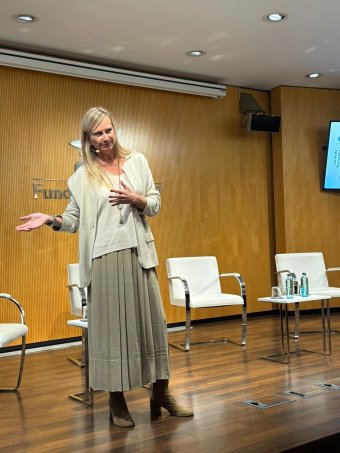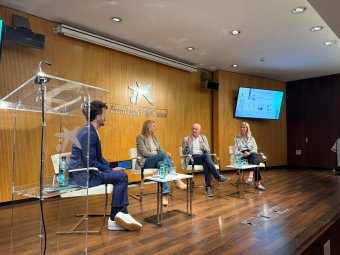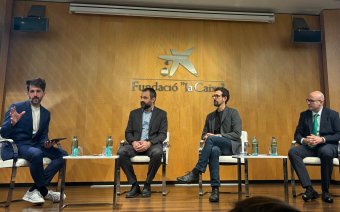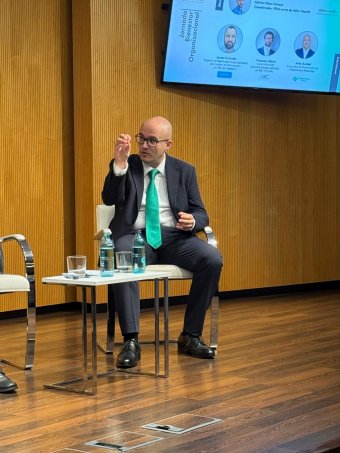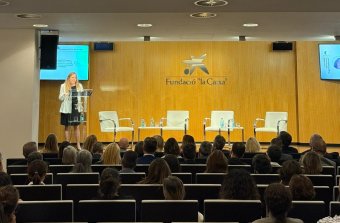
+Compromiso promotes organizational well-being as a key factor for health and sustainability
The alliance of mutual companies +Compromiso, formed by Fundación Personas y Empresas - AUREN6, Fraternidad-Muprespa and Fundación Personas y Empresas - AUREN0, held a day this Wednesday at the Palau Macaya in Barcelona to reflect on the meaning of organizational well-being and how to create healthier and more productive work environments as a key factor for health and sustainability in its almost 550,000 mutual companies.
More and more companies understand that taking care of the health and well-being of their employees is not only a matter of responsibility, but a strategic decision. According to the World Health Organization, companies that implement wellness programs are 20% more productive, and PwC notes that 87% of employees who report a high level of well-being also generate a high level of engagement.
The day, moderated by Adrián Díaz-Caneja, PR and Events coordinator of the consulting firm Affor Health, began with the intervention of Eva Garcés, founding partner of Mendips Talent Development. In his presentation “Leaders who generate well-being”, Garcés has stressed that the mental, emotional and even relational well-being of people in organizations requires a leadership style aligned with a corporate culture that integrates well-being as a strategic value. In this sense, he has pointed out that "the new leadership models talk about caring and challenging, two complementary levers of innovative leadership that promotes the well-being of people and, at the same time, sets clear and ambitious expectations. Caring and challenging are not opposites ".
Mutual round table
During the first round table, under the title “Organizational well-being”, Javier Galindo, organizational well-being expert at Fundación Personas y Empresas - AUREN6, highlighted that there are beginning to be companies that apply a concept of organizational well-being in a more global way, which covers the more traditional ORP, but also the psychosocial risks that affect people, as well as healthy habits. Companies see it as a strategic necessity. " We talk about a global concept because it takes into account the person as a whole, with that backpack that he fills with things, both from the work and personal world. The key is that each one is essential to achieve organizational well-being in the company ".
For his part, Francesc Martí, and specialist in applied psychosociology at Fundación Personas y Empresas - AUREN0, has highlighted the relevance of having well-being indicators, both organizational and individual health and well-being, to evaluate the initial situation in companies and measure the impact of the well-being promotion policies that are implemented. In this sense, he has highlighted the importance of these initiatives not being limited to specific actions, but rather being integrated into a structured model of well-being promotion that guarantees a real improvement in the health of all people in the organization. Finally, has pointed out that “ it is essential to involve middle managers as agents of change, since they are the ones who exert the greatest direct influence on the day-to-day life of the teams ”.
Aritz Acebal, Prevention consultant for and Fraternidad-Muprespa, has put this emphasis on emotional well-being, which considers the software on which the talent of all people is executed, therefore it should be taken as a strategic pillar. " Emotional well-being is not an additional benefit; it is the basis for a solid and sustainable preventive culture. Investing in it not only improves the quality of life of the workforce, but also builds a safer, more resilient and productive workforce ".
Business experiences in organizational well-being management
The conference has also brought together representatives from various companies who have shared their experiences in managing organizational well-being in the workplace.
Eva Roura, Director of Digital Transformation NTT Data Europe & LATAM, has highlighted the crucial role of leadership as the main generator of culture and values throughout an organization, and the importance of integrating health and well-being into KPIs, at the same level as business KPIs.
For his part, Miguel Rodríguez, head of Infrastructure for Spain and Portugal and head of Health in Europe at Henkel Ibérica, has pointed out that in his organization health has ceased to be the responsibility of the occupational doctor and has become a global strategy.
Finally, Heidi Van Woestyne, People & Culture director Iberia of Sanofi, has presented the All Well program, established in the entity, which has a well-being approach based on four pillars: physical well-being, mental well-being, benefits and organizational culture.
Montserrat Solórzano , director of the CNCT of the National Institute of Safety and Health at Work, closed the day by highlighting the speakers' interventions and their quality and congratulating +Compromiso for the organization of events of this type and, especially, for all the work they do for prevention, day after day.
